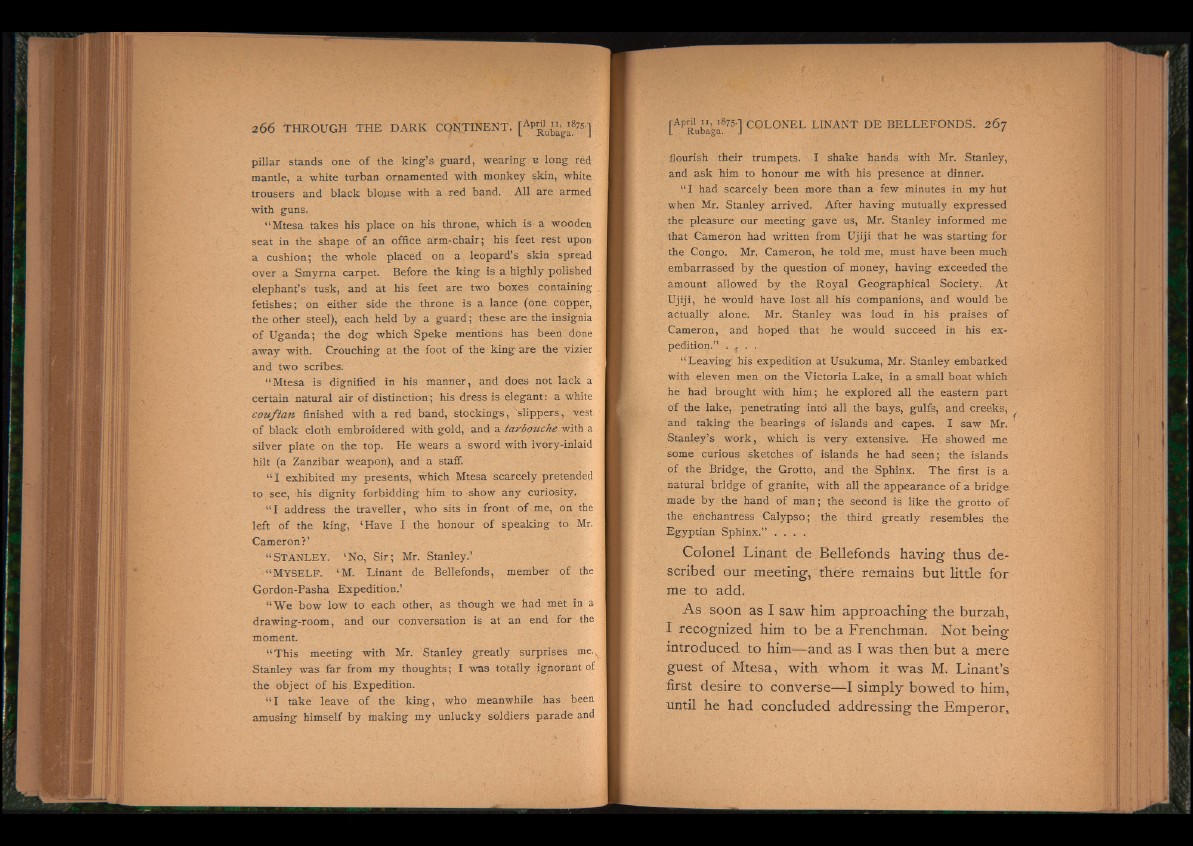
pillar stands one of the king’s guard, wearing a long red
mantle, a white turban ornamented with monkey skin, white
trousers and black blouse with a red band. All are armed
with guns.
“ Mtesa takes his place on his throne, which is a wooden
seat in the shape of an office arm-chair; his feet rest upon
a cushion; the whole placed on a leopard’s skin spread
over a Smyrna carpet. Before the king is a highly polished
elephant’s tusk, and at his feet are two boxes containing
fetishes; on either side the throne is a lance (one copper,
the other steel), each held by a guard; these are the insignia
of Uganda; the dog which Speke mentions has been done
away with. Crouching at the foot of the king are the vizier
and two scribes.
“ Mtesa is dignified in his manner, and does not lack a
certain natural air of distinction; his dress is elegant: a white
couftan finished with a red band, stockings, slippers, vest
of black cloth embroidered with gold, and a tarbouche with a
silver plate on the top. He wears a sword with ivory-inlaid
hilt (a Zanzibar weapon), and a staff.
“ I exhibited my presents, which Mtesa scarcely pretended
to see, his dignity forbidding him to show any curiosity.
“ I address the traveller, who sits in front of me, on the
left of the king, ‘Have I the honour of speaking to Mr.
Cameron?’
“ STANLEY. ‘No, S ir ; Mr. Stanley.’
“ MYSELF. ‘ M. Linant de Bellefonds, member of the
Gordon-Pasha Expedition.’
“We bow low to each other, as though we had met in a
drawing-room, and our conversation is at an end for the
moment.
“ This meeting with Mr. Stanley greatly surprises me.N
Stanley was far from my thoughts; I was totally ignorant of
the object of his Expedition.
“ I take leave of the king, who meanwhile has been
amusing himself by making my unlucky soldiers parade and
flourish their trumpets. I shake hands with Mr. Stanley,
and ask him to honour me with his presence at dinner.
“ I had scarcely been more than a few minutes in my hut
when Mr. Stanley arrived. After having mutually expressed
the pleasure our meeting gave us, Mr. Stanley informed me
that Cameron had written from Ujiji that he was starting for
the Congo. Mr. Cameron, he told me, must have been much
embarrassed by the question of money, having exceeded the
amount allowed by the Royal Geographical Society. At
Ujiji, he would have lost all his companions, and would be
actually alone. Mr. Stanley was loud in his praises of
Cameron, and hoped that he would succeed in his expedition.”
. %
“ Leaving his expedition at Usukuma, Mr. Stanley embarked
with eleven men on the Victoria Lake, in a small boat which
he had brought with him; he explored all the eastern part
of the lake, penetrating into all the bays, gulfs, and creeks,
and taking the bearings of islands and capes. I saw Mr.
Stanley’s work, which is very extensive. He showed me
some curious sketches of islands he had seen; the islands
of the Bridge, the Grotto, and the Sphinx. The first is a
natural bridge of granite, with all the appearance of a bridge
made by the hand of man; the second is like the grotto of
the enchantress Calypso; the third greatly resembles the
Egyptian Sphinx.” . . . .
Colonel Linant de Bellefonds having thus described
our meeting, there remains but little for
me to add.
A s soon as I saw him approaching the burzah,
I recognized him to be a Frenchman. Not being
introduced to him— and as I was then but a mere
guest o f Mtesa, with whom it was M. Linant’s
first desire to converse— I simply bowed to him,
until he had concluded addressing the Emperor,